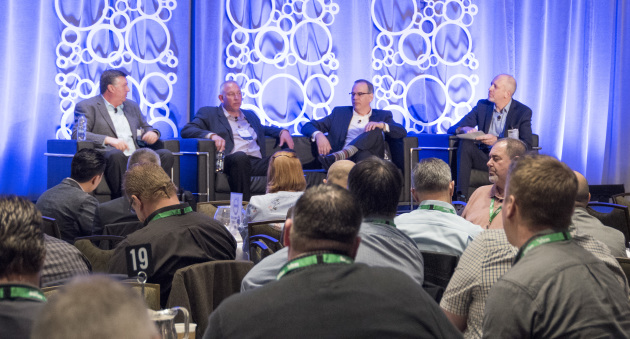Spec’ing the right way
MISSISSAUGA, Ont. – With countless options available at your fingertips, it’s not always easy to spec’ your unique fleet.

To help audience members at this year’s Canadian Fleet Maintenance Summit in their decisions when it comes to spec’ing their own fleet, was a panel of maintenance experts who discussed how they spec’ their trucks and mistakes they’ve made when spec’ing.
Panelists included Chris Iveson of Challenger Motor Freight, Mike Gomes of Bison Transport, and Greg Black of Titanium Transportation Group.
All panelists agreed they have a standard spec’, and that standard changes as new technology is rolled out.
“We have a standard spec’, but we adjust it as technology changes,” he said. “For example, we added collision mitigation systems, lane departure. At Challenger, we like to think we are forward thinkers, so we change with the times.”
He said that something Challenger is doing more and more is relying on its internal driver groups to survey them on their wants and needs.
“We want to know what’s going to keep them happy,” he said. “I don’t need to tell anyone here how important retention is. So as we build a truck, we make sure to keep the driver top of mind.”
Iveson said he gets feedback from his drivers by being present and known in the shop as well as driver surveys.
“I like to think I have a good relationship with key drivers,” he said. “So I make sure I listen to what they say. We have driver input groups, and a couple years ago, we brought in a bunch of trucks and allowed them to answer a survey on what thy liked and didn’t like.”
Gomes agreed.
“We have a spec’ committee that is made up of maintenance people, operations people, and drivers,” he said. “And they’re looking at what systems are available and what’s working today and it’s about validating what we’re investing in.”
Unfortunately, when you’re an early adopter, you don’t have the luxury of only installing the tried and true technologies. Sometimes, you invest in a product or technology that doesn’t work for your application. And when this happens, it’s a nightmare, the panelists confirmed.
“One of the worst things we lived though in our fleet, was a standard option that came on the trailer, when we didn’t do enough validation on the product before we accepted it,” Iveson recalls. “On a series of 1,000 trailers…it was the landing gear. For the first year and the second year, everything worked okay…and we expected it to last five yeas. But after two years we noticed extreme premature wear.”
Upon further investigation, Iveson said the landing gear was offshore, and definitely not made for Canadian climates.
“Over the next number of years, we worked with the vendor to get it all changed out,” he said. “But it became an issue for us. Not only did it cost a lot of money, but there was all that downtime that was never recovered.”
Black said he went through a similar experience when Titanium made a choice on a trailer.
“It was a complete flop,” he said. “All parts should have lasted five to six years, and we saw failures after two years.”
Gomes said spec’ing wheel covers was a mistake for Bison’s fleet.
“The product worked, but it created problems,” he said. “It would interfere with the drivers’ pre-trip and it would retain dirt and other materials in the wheel. We had rims that were being eroded. So while they worked in terms of fuel economy, the cost in other areas made us have to remove them….Being on the leading edge of technology, we pride ourselves on being innovative…but sometimes being on the edge, you can trip and cut yourself.”
Iveson advised audience members to make sure you are familiar with every product you’re spec’ing.
“Because at the end of the day, vendors are looking to sell something for a profit,” he said.
Black agreed adding to make sure to “read the fine print so you’re missing anything.”
When it comes to choose spec’s the relationship between fleet and vendor also need to align, Gomes brought up.
“The vendor has to know what our core values are,” he said. “Such as safety, driver comforts…So we ask does the supplier follow along these guidelines?”
After the sale is also important to Bison, Gomes said.
“It’s the aftermarket support that is so important,” he said. “Is the warranty exclusions list longer than the inclusions list? How willing is the supplier to work with you after the sale? That’s critical.”
Iveson agreed comparing the relationship between fleets and suppliers/OEs to a marriage.
“I like to think of partnerships as being important,” he said. “Does the vendor want to parents with us for join success? Everyone is rosy and happy to push product. But the real flavor of the pudding is when the going gets tough…We have numerous tractor OEs that we’ve has successful relationships with and those are the ones that allow me to sleep easy at night. They take charge and ownership of what’s happened.”
Have your say
This is a moderated forum. Comments will no longer be published unless they are accompanied by a first and last name and a verifiable email address. (Today's Trucking will not publish or share the email address.) Profane language and content deemed to be libelous, racist, or threatening in nature will not be published under any circumstances.